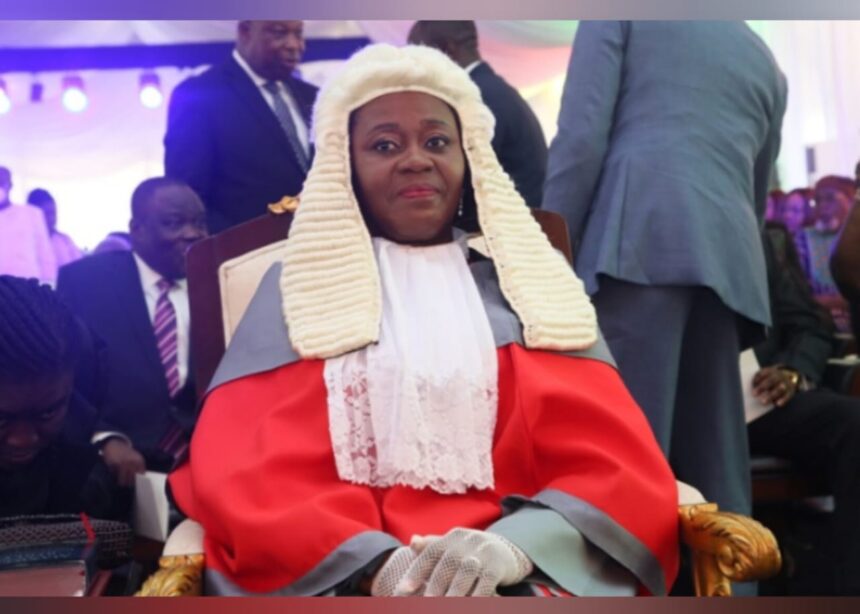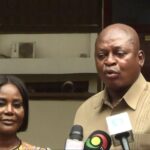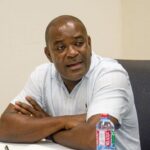In addition to being a personal attempt at self-justification, suspended Chief Justice Gertrude Torkornoo’s historic lawsuit against the Republic of Ghana at the ECOWAS Court of Justice is a high-stakes constitutional drama on both a national and regional level.
President John Dramani Mahama suspended her on April 22, 2025, and she has since demanded an astounding $10 million in compensation for alleged moral and reputational damages.
Ghana is currently embroiled in a heated national debate concerning the independence of its judiciary and the fundamental tenets of its democracy.
In Ghana’s 68-year history, this is the first time a sitting Chief Justice has been threatened with removal and has reacted with a regional lawsuit.
A strong human component lies at the core of Chief Justice Torkornoo’s ECOWAS lawsuit. She claims that her suspension is a violation of Articles 5, 7, and 15 of the African Charter on Human and Peoples’ Rights, which guarantee her the fundamental human rights to dignity, a fair trial, and fair working conditions.
Her filing depicts a leader who endured “immeasurable public ridicule,” in addition to professional harm, outside of the legal system.
Chief Justice Torkornoo emphasized the “unprecedented nature” of her case in a June 25, 2025, televised speech to the country, claiming that the “perversion of law, rules, and due process… are driving the proceedings and this renders the proceedings unconstitutional.”
Some Ghanaians find resonance in her personal story, wondering if politics are involved or if due process is really being followed.
Sixty-two per cent of Ghanaians say they have little or no trust in the courts, a sharp increase from thirty per cent in 2005–06.
Recent Afrobarometer surveys show an alarming decline in public trust. A startling 97% of Ghanaians believe that judges and magistrates are corrupt, which is even more glaring given how the court handles politically delicate cases.
Handling Two Jurisdictions
It’s an interesting legal tightrope walk to decide to go to the ECOWAS Court while domestic proceedings are still going on.
Although Chief Justice Torkornoo’s application for an injunction was denied by Ghana’s Supreme Court on the grounds of admissibility rather than merit, the legality of the procedure is still up for debate at the national level.
If the case is not before another international court, the ECOWAS Court, a human rights court of first instance, has a well-established jurisprudence of hearing cases even when concurrent domestic proceedings are underway.
According to private attorney Martin Kpebu, “Under ECOWAS jurisprudence, having a case before a domestic court is not a bar to filing before the ECOWAS Court.”
The more stringent exhaustion requirements of certain other international tribunals contrast with this principle. The ECOWAS Court’s dedication to guaranteeing access to regional human rights remedies is demonstrated by cases such as Registered Trustees of HEDA Resource Centre v. Republic of Nigeria (2021).
The ECOWAS recourse, however, is seen as a mistake by some Ghanaian legal experts, such as Kwaku Ansah Asare, the former director of the Ghana School of Law. He contends that judicial removal is clearly outlined in Article 146 of Ghana’s 1992 Constitution. “Our procedures are firmly embedded in the High Court rules and the Evidence Act of 1975. ECOWAS does not have a sub-regional procedure that we are violating.”
According to him, the Chief Justice is “shooting herself in the foot” and “worsening her own predicament through missteps.”
This disagreement highlights the intricate relationship that exists in West Africa between national sovereignty and developing regional legal systems.
Subtexts of Politics
The administration of President Mahama, represented by justices such as Justice Srem-Sai, the Deputy Attorney General, who verified the ECOWAS filing on July 4, 2025, insists that its actions strictly comply with Article 146 of the 1992 Constitution.
The article specifies that before a committee of inquiry is formed, the Council of State must present a prima facie case. The opposition New Patriotic Party (NPP) has mostly kept a close eye on things, pointing out the political danger of criticizing the judiciary while the ruling National Democratic Congress (NDC) highlights its dedication to constitutional fidelity.
The public narrative, however, is much less taciturn. Because of previous rhetoric, many Ghanaians see the process through a political prism.
“The Chief Justice’s removal is political. We heard President Mahama suggest the court is packed with NPP people and that his appointees should prepare to take over. It’s political,” Ghanaian law student Ato Yawson expressed a similar opinion.
The rule of law and democratic accountability, which are crucial for both domestic stability and international standing, could be seriously threatened if this impression of political meddling is confirmed by the ECOWAS ruling.
Additionally, the Commonwealth Lawyers Association (CLA) has expressed concern, pointing out that “the power to suspend a judge may be abused to penalize or intimidate independent-minded judges and to prevent them from deciding cases.”
Ghana’s judicial crisis has real economic ramifications in addition to legal and political ones. Legal experts caution that protracted legal disputes and unclear regulations may discourage foreign direct investment (FDI), which is crucial to Ghana’s plans for industrialization.
Strong rule of law and predictable legal environments are essential for investor confidence. Despite Ghana’s IMF-backed reforms, a bad result at ECOWAS or a persistent sense of judicial vulnerability could put pressure on asset values and affect the country’s marketability.
The fate of Chief Justice Torkornoo is not relevant to the ECOWAS Court’s final decision. It will change Ghana’s judicial independence’s course and establish a strong precedent of accountability for the country’s top officials. The future of justice and democratic governance throughout the African continent will be permanently shaped by this ruling.






